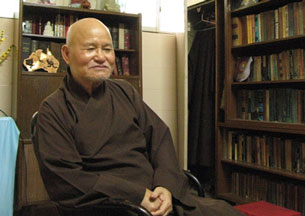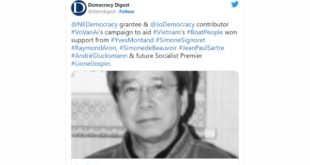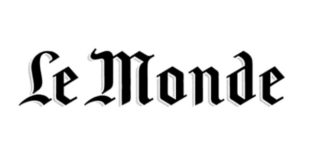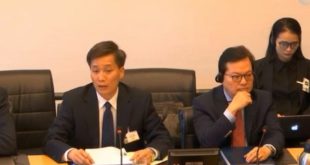BANGKOK, 2 April 2009 (RFA) – A leading dissident Buddhist monk in Vietnam, Thich Quang Do, has joined scientists and a leading war hero in opposing plans to mine bauxite in Vietnam, citing concerns for the environment and indigenous people, his organization has said.
Do, the head of the banned Unified Buddhist Church of Vietnam (UBCV) and under de facto house arrest in Ho Chi Minh City, urged workers to stay away from factories to protest the plan to allow Chinese companies to mine bauxite in Vietnam’s Central Highlands.
 |
|
Buddhist monk Thich Quang Do sits inside the Thanh Minh Zen Monastry in Ho Chi Minh City, July 27, 2007 (Photo AFP)
|
The planned project “will destroy the forests of the Central Highlands, pollute the basalt-rich red soils, increase the risk of prolonged periods of drought or flooding, and seriously contaminate water supplies, thus directly threatening the economic development of the southern regions of Central Vietnam,” he said in a statement.
“This project is not the fruit of studies by economists or environmental experts, but an illustration of Vietnam’s dependence on China,” he said, calling for a month of “peaceful demonstrations at home” in May.
Government plan
A number of Vietnamese scientists and intellectuals have denounced the government for allowing Chinese involvement in the project, which they say undermines national sovereignty and the environment.
Prime Minister Nguyen Tan Dung has called bauxite exploitation “a major policy of the party and the state” and approved several large-scale mining projects for the country’s Central Highlands.
The government’s master plan calls for investments of around U.S. $15 billion by 2025 to tap Vietnam’s rich bauxite reserves, estimated to be the third-largest in the world.
Bauxite is considered the most important aluminum ore and is generally strip-mined.
Earlier media reports said Dung had approved a directive in November allowing the mining, processing, and use of bauxite ore in the mountainous coffee-growing region.
Most residents say they expect the mine to provide badly needed jobs, as Vietnam’s economy slows sharply as a result of the worldwide slowdown.
State-run Vietnam National Coal and Mineral Industries Group (Vinacomin) has begun building an aluminum factory and is preparing for major mining operations in Lam Dong and Dac Nong provinces.
Vinacomin is aiming for annual aluminum production of 4.8 million to 6.6 million tons by 2015, state media have reported.
Serious risk
In January, war hero Gen. Vo Nguyen Giap, 97, sent an open letter to Dung asking for the bauxite mining plans to be put on hold until international experts had studied the environmental impact.
Giap, writing for the online news site VietnamNet, also said he feared the mining could harm ethnic minorities in the region.
Giap still wields moral authority in Vietnam for leading the defeat of French colonial forces and Americans as military leader and confidant to late revolutionary leader Ho Chi Minh.
He cited concerns among scientists and activists about “the serious risk to the natural and social environment posed by bauxite exploitation projects.”
“However, these projects have still been implemented,” he added.
Giap said that in the early 1980s he had overseen a study on whether to mine for bauxite in the region, and that Soviet experts had advised against the project because of the “risk of serious ecological damage.”
The Unified Buddhist Church has been banned since the early 1980s when it refused to join the state-sanctioned Vietnam Buddhist Church.
Original reporting by RFA’s Vietnamese service. Vietnamese service director: Diem Nguyen. Executive producer: Susan Lavery. Written for the Web in English by Sarah Jackson-Han.
 Quê Me Quê Me: Action for democracy in Vietnam & Vietnam Committee on Human Rights
Quê Me Quê Me: Action for democracy in Vietnam & Vietnam Committee on Human Rights




